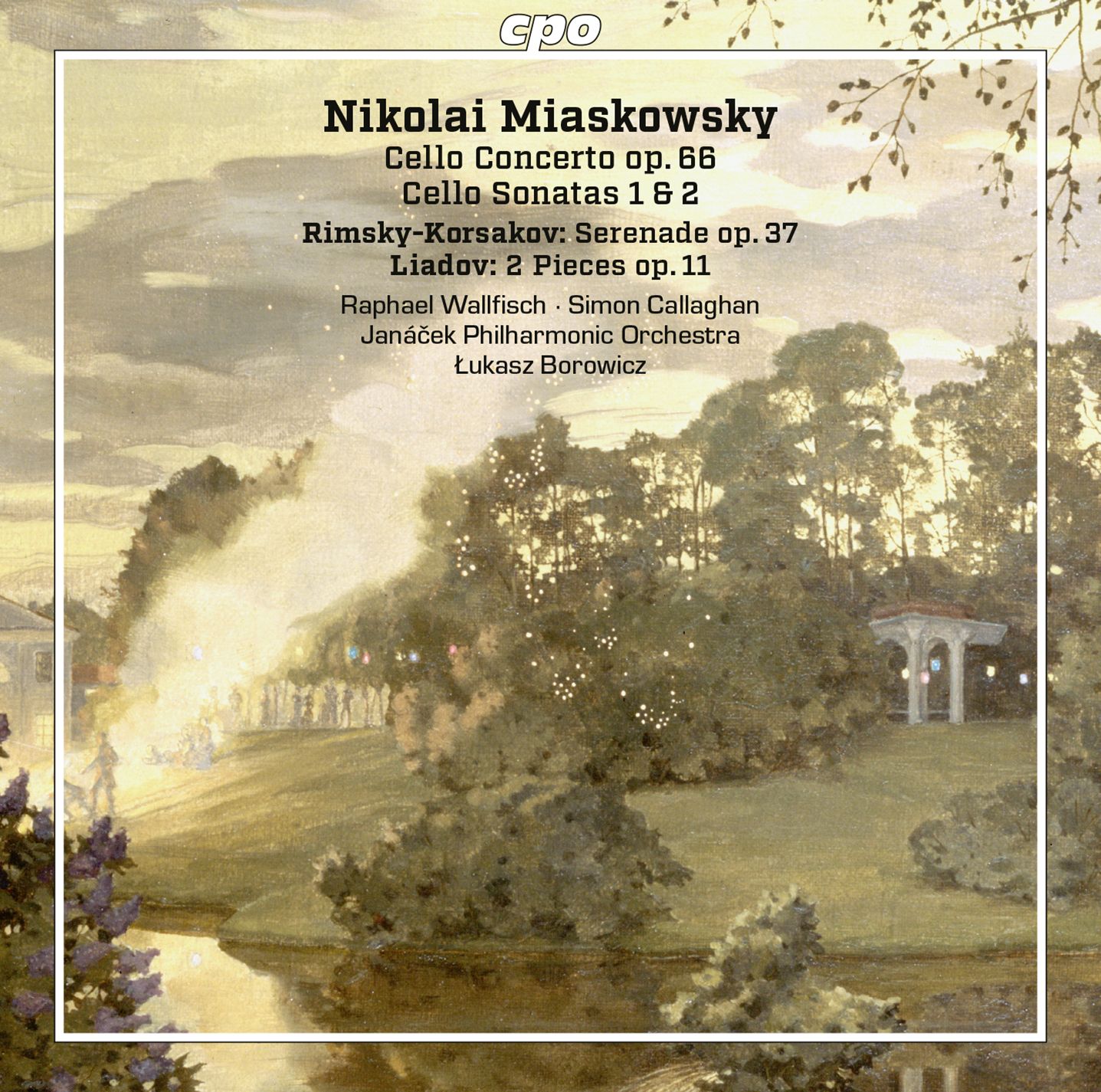Miaskovsky Cello Concerto & Sonatas - plus Liadov and Rimsky!
A fine release, The inclusion of the Liadov seals the deal for me!

We are revisiting Myaskovsky's Cellos Sonatas Nos. 1 and 2 here, as well as the Rimsky-Korsakov Serenade, but adding a Cello Concerto to the mix and a couple of pieces by that wonderful composer of miniatures, Anatoly Liadov (1855-1914). Previously, Classical Explorer covered Liliana Kehayova and Kristina Miller' s performances of the Sonatas on the Dynamic label. Both performances are excellent, but it is the addition of the Cello Concerto that is relevant here and, for me, tips the balance.
It is difficult for any performance of Miaskovsky's First Cello Sonata to scale the heights of Rostropovich and Sir Malcolm Sargent in their performance, best known these days through a reissue on EMI's Great Recordings of the Century (a series fondly known as "GROC"). Here's my review of that release on Musicweb International. Rostropovich has a character that is larger than life there, and Wallfisch's rather more reined-in advocacy complements it well. Fans of the much-missed Olympia label might wish to search our Maria Tarasova's account with the Moscow New Opera Orchestra under Yevgeny Samiolov (again, here’s my review of the Regis reissue of the Olympia).
Written late in 1944, the First Cello Concerto was permiered by Sviatoslav Knushevitsky (who formed part of a stellar trio with Lev Oborin and David Oistrakh). The piece is in two moveents, both expansive, both with pronounced ruminative sections. The second movement in particular plumbs the depths - it certainly does with Wallfisch and the Janáček Philharmonic Orchestra under Łukasz Borowicz. But it starts from a point of huge energy, moving eventually to what in Wallfisch's hands is a gargantuan, towering cadenza followed by the most relishable outing of Russian melancholy via the Janáček Orchestra and Borowicz:
Borowicz also seems to appreciate the magic of some of Myaskovsky's harmonic arrivals, while Wallfisch's playing is revelatory. Only Rostropovich and Knusheviysky, he seems to imply, could have loved this piece as much.
The first movement of the Concerto is basically in sonata form, with the notable distinction that Myaskovsky replaces the development section with a solo cadenza. The movement is predominantly slow (Lento ma non troppo - Andante - Tempo I), and how this particular performance loves it. Borowetz finds so much detail in the score (and how can one not make parallels with Shostakovich when the lower strings alone give out a long-breated melody?). But the solo melody that follows is all-Myaskovsky:
For the Cello Sonata, Raphael Wallfisch is joined by pianist Simon Callaghan on this cpo release. Callaghan is a brilliant pianist, and the two players are clearly in resonance with each other. The venue changes for the balance of pieces, although the disc was recorded over two months (September 2020, Dům kultury města Otravy for the concerto; Wyastone Concerto Hall, October 2020 for the balance), The Wyastone recording seems less satisfactory, but that said, this remains a fine performance.
Premiered in March 1913, the First Sonata is an early work. Cast in two movements, it has huge appeal in its melodic fertility and its sense of easy flow. Callaghan excels in the second movement - such fluidity of finger, while Wallfisch is markedly passionate (his cello sounds slightly restricted in thsi recording though, in comparison with the concerto). Here's that miraculous second movement:
The delights of the Liadov pieces are many. Wallfisch and Borowicz chose to insert a couple of pieces by from that composer's Trois Morceaux, Op. 11. The first is a melodious Prelude:
... compemented by a fractious Mazurka:
Rimsky’s Serenade, Op. 37 (heard also on the Dynamic disc) is a lovely bit of salon music, with Callaghan keeping the mood buoyant, underpinning Wallfisch's superb playing:
... and so back to Mysaskovsky, the Second Cello Sonata, Op. 81 0f 1949 - a difficult time for composers who did not absolutely toe the Soviet line. The composer was not well at the time, also. Yet he wrote a piece of remarkable serenity. As the excellent booklet notes point out, there is ore than a hint of Fauré fragrance to the first movement:
There is much tendeness (or is that tendresse?) in the central Andante cantabile, before the fast, restless finale provides the perfect close. The almost moto perpetuo part for solo cello is expertly negotiated by Wallfisch:
A fine release, The inclusion of the Liadov (in spite of the change of acoustic) seals the deal for me.
If you are looking for some more Liadov, a remarkable disc of Piano Music from a Russian Dynasty of music by Liadov, Antipov and Pomazansky is available on the Grand Piano label. It offers a tranche of World Premiere recordings, and 13 pieces in total by Liadov. The performers are Dmitry Korostelyov and Olga Solovieva. Try this glittering Marche Militaire of 1852 (which includes a lovely side glance to a piece you will no doubt know!):
The Grand Piano disc is only £5.99 currently at Amazon.
